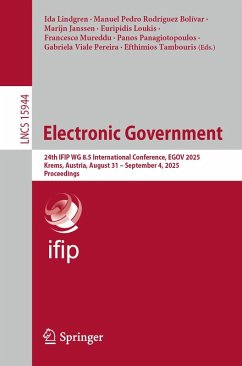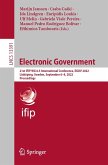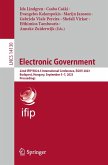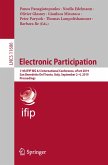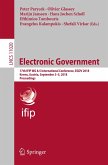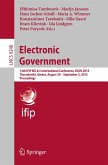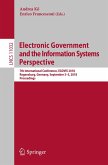Electronic Government (eBook, PDF)
24th IFIP WG 8.5 International Conference, EGOV 2025, Krems, Austria, August 31 - September 4, 2025, Proceedings
Redaktion: Lindgren, Ida; Tambouris, Efthimios; Viale Pereira, Gabriela; Panagiotopoulos, Panos; Mureddu, Francesco; Loukis, Euripidis; Janssen, Marijn; Rodríguez Bolívar, Manuel Pedro
104,95 €
104,95 €
inkl. MwSt.
Sofort per Download lieferbar

52 °P sammeln
104,95 €
Als Download kaufen

104,95 €
inkl. MwSt.
Sofort per Download lieferbar

52 °P sammeln
Jetzt verschenken
Alle Infos zum eBook verschenken
104,95 €
inkl. MwSt.
Sofort per Download lieferbar
Alle Infos zum eBook verschenken

52 °P sammeln
Electronic Government (eBook, PDF)
24th IFIP WG 8.5 International Conference, EGOV 2025, Krems, Austria, August 31 - September 4, 2025, Proceedings
Redaktion: Lindgren, Ida; Tambouris, Efthimios; Viale Pereira, Gabriela; Panagiotopoulos, Panos; Mureddu, Francesco; Loukis, Euripidis; Janssen, Marijn; Rodríguez Bolívar, Manuel Pedro
- Format: PDF
- Merkliste
- Auf die Merkliste
- Bewerten Bewerten
- Teilen
- Produkt teilen
- Produkterinnerung
- Produkterinnerung

Bitte loggen Sie sich zunächst in Ihr Kundenkonto ein oder registrieren Sie sich bei
bücher.de, um das eBook-Abo tolino select nutzen zu können.
Hier können Sie sich einloggen
Hier können Sie sich einloggen
Sie sind bereits eingeloggt. Klicken Sie auf 2. tolino select Abo, um fortzufahren.

Bitte loggen Sie sich zunächst in Ihr Kundenkonto ein oder registrieren Sie sich bei bücher.de, um das eBook-Abo tolino select nutzen zu können.
This LNCS conference set constitutes the proceedings of the 24th IFIP WG 8.5 International Conference on Electronic Government, EGOV 2025, in Krems, Austria, held during August 31-September 4, 2025.
The 25 full papers presented were carefully selected from 116 submissions. They were categorized under the topical sections as follows: E-Government and E-Governance; Emerging Issues and Innovations; Open Data; Smart Cities; AI, Data Analytics and Automated Decision-Making.
- Geräte: PC
- ohne Kopierschutz
- eBook Hilfe
- Größe: 26.41MB
Andere Kunden interessierten sich auch für
![Electronic Participation (eBook, PDF) Electronic Participation (eBook, PDF)]() Electronic Participation (eBook, PDF)52,95 €
Electronic Participation (eBook, PDF)52,95 €![Electronic Government (eBook, PDF) Electronic Government (eBook, PDF)]() Electronic Government (eBook, PDF)72,95 €
Electronic Government (eBook, PDF)72,95 €![Electronic Government (eBook, PDF) Electronic Government (eBook, PDF)]() Electronic Government (eBook, PDF)68,95 €
Electronic Government (eBook, PDF)68,95 €![Electronic Participation (eBook, PDF) Electronic Participation (eBook, PDF)]() Electronic Participation (eBook, PDF)40,95 €
Electronic Participation (eBook, PDF)40,95 €![Electronic Government (eBook, PDF) Electronic Government (eBook, PDF)]() Electronic Government (eBook, PDF)40,95 €
Electronic Government (eBook, PDF)40,95 €![Electronic Government (eBook, PDF) Electronic Government (eBook, PDF)]() Electronic Government (eBook, PDF)40,95 €
Electronic Government (eBook, PDF)40,95 €![Electronic Government and the Information Systems Perspective (eBook, PDF) Electronic Government and the Information Systems Perspective (eBook, PDF)]() Electronic Government and the Information Systems Perspective (eBook, PDF)40,95 €
Electronic Government and the Information Systems Perspective (eBook, PDF)40,95 €-
-
-
This LNCS conference set constitutes the proceedings of the 24th IFIP WG 8.5 International Conference on Electronic Government, EGOV 2025, in Krems, Austria, held during August 31-September 4, 2025.
The 25 full papers presented were carefully selected from 116 submissions. They were categorized under the topical sections as follows: E-Government and E-Governance; Emerging Issues and Innovations; Open Data; Smart Cities; AI, Data Analytics and Automated Decision-Making.
The 25 full papers presented were carefully selected from 116 submissions. They were categorized under the topical sections as follows: E-Government and E-Governance; Emerging Issues and Innovations; Open Data; Smart Cities; AI, Data Analytics and Automated Decision-Making.
Dieser Download kann aus rechtlichen Gründen nur mit Rechnungsadresse in A, B, BG, CY, CZ, D, DK, EW, E, FIN, F, GR, HR, H, IRL, I, LT, L, LR, M, NL, PL, P, R, S, SLO, SK ausgeliefert werden.
Produktdetails
- Produktdetails
- Verlag: Springer Nature Switzerland
- Seitenzahl: 416
- Erscheinungstermin: 19. August 2025
- Englisch
- ISBN-13: 9783032015891
- Artikelnr.: 75246166
- Verlag: Springer Nature Switzerland
- Seitenzahl: 416
- Erscheinungstermin: 19. August 2025
- Englisch
- ISBN-13: 9783032015891
- Artikelnr.: 75246166
- Herstellerkennzeichnung Die Herstellerinformationen sind derzeit nicht verfügbar.
.- E-Government and E-Governance.
.- Navigating Crisis and Digital Transformation: Swedish
School Leadership During the COVID-19 Pandemic.
.- Tinkering for Person-Centredness: Infrastructuring in
Digital Public Healthcare.
.- Digital Transformation through Collective Social Action
How Resource Disparities Can be Leveraged in
Inter-Municipal Collaboration.
.- Public values in e-government: A systematic literature
review and research agenda.
.- E-Files in Public Administration - Biases and Uses.
.- 'Information in all its Different Guises': Exploring the
Elusive Concept of Information.
.- Stewarding of Open Government Data a versatile task
requiring a versatile role.
.- Emerging Issues and Innovations.
.- Government as a Platform Partner: A Literature Review of
How Public Agencies Strategically Govern Their
Participation in Platform Ecosystems.
.- Immigrants' Perceptions Towards Using Generative AI
Conversational Agents to Bridge Administrative Literacy.
.- Designing for Trust in Healthcare Data Sharing: Trust
Anchors in the Trust Framework Lifecycle.
.- GovTech Incubators: Bridging the Gap Between Prototypes and
Long-Term Implementation.
.- The Contextual Edge: LLMs and Sweden s Public Sector
Transformation.
.- SeMoX: Standardizing Standardization A Semantic-driven
Approach for Aligning Data Standards.
.- Open Data.
.- Enhancing Data Discoverability: A semantic item-based
recommendation system for Open Data Catalogues.
.- May the Data Be with You: Towards an AI-Powered Semantic
Recommender for Unlocking Dark Data.
.- Smart Cities.
.- Women's safety perception in the smart city: Does smartness
make a difference?.
.- Maturity Models for Digital Twins in Smart Cities
Literature Review and Comparison.
.- AI, Data Analytics and Automated Decision-Making.
.- AI-Driven Decision Support for Public Budgeting: Insights
from an Exploratory Case Study.
.- AdmPModeler: Modeling Administrative Processes using Large
Language Models. A Case Study.
.- Towards Efficient and Interpretable Machine Learning for
Classifying Petition Admissibility: A Case Study of the
JOIN Platform.
.- Review of AI features to support mass deliberations.
.- TAPAS: A Pattern-Based Approach to Assessing Government
Transparency.
.- Integrating Knowledge Graphs, Large Language Models and
Explainable AI Techniques to improve Public Health Question
Answering.
.- Evaluating Open and Proprietary Large Language Models in
Law Interpretation: The Case of the EU VAT Directive.
.- Proactive public services in the age of artificial
intelligence: Towards post-bureaucratic governance.
.- Navigating Crisis and Digital Transformation: Swedish
School Leadership During the COVID-19 Pandemic.
.- Tinkering for Person-Centredness: Infrastructuring in
Digital Public Healthcare.
.- Digital Transformation through Collective Social Action
How Resource Disparities Can be Leveraged in
Inter-Municipal Collaboration.
.- Public values in e-government: A systematic literature
review and research agenda.
.- E-Files in Public Administration - Biases and Uses.
.- 'Information in all its Different Guises': Exploring the
Elusive Concept of Information.
.- Stewarding of Open Government Data a versatile task
requiring a versatile role.
.- Emerging Issues and Innovations.
.- Government as a Platform Partner: A Literature Review of
How Public Agencies Strategically Govern Their
Participation in Platform Ecosystems.
.- Immigrants' Perceptions Towards Using Generative AI
Conversational Agents to Bridge Administrative Literacy.
.- Designing for Trust in Healthcare Data Sharing: Trust
Anchors in the Trust Framework Lifecycle.
.- GovTech Incubators: Bridging the Gap Between Prototypes and
Long-Term Implementation.
.- The Contextual Edge: LLMs and Sweden s Public Sector
Transformation.
.- SeMoX: Standardizing Standardization A Semantic-driven
Approach for Aligning Data Standards.
.- Open Data.
.- Enhancing Data Discoverability: A semantic item-based
recommendation system for Open Data Catalogues.
.- May the Data Be with You: Towards an AI-Powered Semantic
Recommender for Unlocking Dark Data.
.- Smart Cities.
.- Women's safety perception in the smart city: Does smartness
make a difference?.
.- Maturity Models for Digital Twins in Smart Cities
Literature Review and Comparison.
.- AI, Data Analytics and Automated Decision-Making.
.- AI-Driven Decision Support for Public Budgeting: Insights
from an Exploratory Case Study.
.- AdmPModeler: Modeling Administrative Processes using Large
Language Models. A Case Study.
.- Towards Efficient and Interpretable Machine Learning for
Classifying Petition Admissibility: A Case Study of the
JOIN Platform.
.- Review of AI features to support mass deliberations.
.- TAPAS: A Pattern-Based Approach to Assessing Government
Transparency.
.- Integrating Knowledge Graphs, Large Language Models and
Explainable AI Techniques to improve Public Health Question
Answering.
.- Evaluating Open and Proprietary Large Language Models in
Law Interpretation: The Case of the EU VAT Directive.
.- Proactive public services in the age of artificial
intelligence: Towards post-bureaucratic governance.
.- E-Government and E-Governance.
.- Navigating Crisis and Digital Transformation: Swedish
School Leadership During the COVID-19 Pandemic.
.- Tinkering for Person-Centredness: Infrastructuring in
Digital Public Healthcare.
.- Digital Transformation through Collective Social Action
How Resource Disparities Can be Leveraged in
Inter-Municipal Collaboration.
.- Public values in e-government: A systematic literature
review and research agenda.
.- E-Files in Public Administration - Biases and Uses.
.- 'Information in all its Different Guises': Exploring the
Elusive Concept of Information.
.- Stewarding of Open Government Data a versatile task
requiring a versatile role.
.- Emerging Issues and Innovations.
.- Government as a Platform Partner: A Literature Review of
How Public Agencies Strategically Govern Their
Participation in Platform Ecosystems.
.- Immigrants' Perceptions Towards Using Generative AI
Conversational Agents to Bridge Administrative Literacy.
.- Designing for Trust in Healthcare Data Sharing: Trust
Anchors in the Trust Framework Lifecycle.
.- GovTech Incubators: Bridging the Gap Between Prototypes and
Long-Term Implementation.
.- The Contextual Edge: LLMs and Sweden s Public Sector
Transformation.
.- SeMoX: Standardizing Standardization A Semantic-driven
Approach for Aligning Data Standards.
.- Open Data.
.- Enhancing Data Discoverability: A semantic item-based
recommendation system for Open Data Catalogues.
.- May the Data Be with You: Towards an AI-Powered Semantic
Recommender for Unlocking Dark Data.
.- Smart Cities.
.- Women's safety perception in the smart city: Does smartness
make a difference?.
.- Maturity Models for Digital Twins in Smart Cities
Literature Review and Comparison.
.- AI, Data Analytics and Automated Decision-Making.
.- AI-Driven Decision Support for Public Budgeting: Insights
from an Exploratory Case Study.
.- AdmPModeler: Modeling Administrative Processes using Large
Language Models. A Case Study.
.- Towards Efficient and Interpretable Machine Learning for
Classifying Petition Admissibility: A Case Study of the
JOIN Platform.
.- Review of AI features to support mass deliberations.
.- TAPAS: A Pattern-Based Approach to Assessing Government
Transparency.
.- Integrating Knowledge Graphs, Large Language Models and
Explainable AI Techniques to improve Public Health Question
Answering.
.- Evaluating Open and Proprietary Large Language Models in
Law Interpretation: The Case of the EU VAT Directive.
.- Proactive public services in the age of artificial
intelligence: Towards post-bureaucratic governance.
.- Navigating Crisis and Digital Transformation: Swedish
School Leadership During the COVID-19 Pandemic.
.- Tinkering for Person-Centredness: Infrastructuring in
Digital Public Healthcare.
.- Digital Transformation through Collective Social Action
How Resource Disparities Can be Leveraged in
Inter-Municipal Collaboration.
.- Public values in e-government: A systematic literature
review and research agenda.
.- E-Files in Public Administration - Biases and Uses.
.- 'Information in all its Different Guises': Exploring the
Elusive Concept of Information.
.- Stewarding of Open Government Data a versatile task
requiring a versatile role.
.- Emerging Issues and Innovations.
.- Government as a Platform Partner: A Literature Review of
How Public Agencies Strategically Govern Their
Participation in Platform Ecosystems.
.- Immigrants' Perceptions Towards Using Generative AI
Conversational Agents to Bridge Administrative Literacy.
.- Designing for Trust in Healthcare Data Sharing: Trust
Anchors in the Trust Framework Lifecycle.
.- GovTech Incubators: Bridging the Gap Between Prototypes and
Long-Term Implementation.
.- The Contextual Edge: LLMs and Sweden s Public Sector
Transformation.
.- SeMoX: Standardizing Standardization A Semantic-driven
Approach for Aligning Data Standards.
.- Open Data.
.- Enhancing Data Discoverability: A semantic item-based
recommendation system for Open Data Catalogues.
.- May the Data Be with You: Towards an AI-Powered Semantic
Recommender for Unlocking Dark Data.
.- Smart Cities.
.- Women's safety perception in the smart city: Does smartness
make a difference?.
.- Maturity Models for Digital Twins in Smart Cities
Literature Review and Comparison.
.- AI, Data Analytics and Automated Decision-Making.
.- AI-Driven Decision Support for Public Budgeting: Insights
from an Exploratory Case Study.
.- AdmPModeler: Modeling Administrative Processes using Large
Language Models. A Case Study.
.- Towards Efficient and Interpretable Machine Learning for
Classifying Petition Admissibility: A Case Study of the
JOIN Platform.
.- Review of AI features to support mass deliberations.
.- TAPAS: A Pattern-Based Approach to Assessing Government
Transparency.
.- Integrating Knowledge Graphs, Large Language Models and
Explainable AI Techniques to improve Public Health Question
Answering.
.- Evaluating Open and Proprietary Large Language Models in
Law Interpretation: The Case of the EU VAT Directive.
.- Proactive public services in the age of artificial
intelligence: Towards post-bureaucratic governance.
